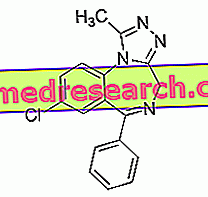Edited by Jacopo Zuffi, courtesy of La Palestra magazine
In the human body, proteins have a mainly plastic / structural function because they provide most of the "bricks" with which we are made. In addition to the importance of nutritional character, the intake of proteins as supplements, is indicated in sports whenever you want to ensure an increase or maintenance of the lean mass at the expense of fat mass.
The athlete or the sportsman engaged in a weight training program, aimed at increasing explosive or maximal strength, such as the one looking for muscular hypertrophy, usually combines a nutritional level of protein between 1, 5 g / kg and 2.5 g / kg the day.
While traditional protein sources, such as white meat, fish and eggs, are taken at main meals, without particular distinction, in the case of powdered protein supplements (derived from milk) the focus has shifted not only on the quality of the ingredients but also on the timing of recruitment.
The market offer of these products is essentially focused on supplements made exclusively of whey proteins (isolated, ultra filtered, hydrolyzed and concentrated) or from casein-based supplements and / or a mix of these with whey proteins, in the most disparate proportions ( 80% -20%, 50% -50%, 75% - 25%) depending on the manufacturer and the purpose of the product.
Whey protein
Whey proteins are globular proteins, rich in essential amino acids, in particular branched chain amino acids, also contain glycomacropeptide fractions, characterized by a marked neo-glucogenic functionality (production of glucose from glucogenic amino acids, including glycine, glutamine, valine and isoleucine). The studies carried out on the use of serum proteins in sports have shown a greater ability of the same, compared to other protein supplements, to stimulate protein synthesis, especially if taken in the post-workout phase, in conjunction with carbohydrates with medium to high glycemic index ( maltodextrin, vitargo and dextrose).
Whey proteins are naturally rich in cysteine, which stimulates the production of glutathione (GSH) endogenous substance with antioxidant potential. The rate of assimilation of serum proteins is so high that, a few minutes after intake, the levels of leucine in the blood (biochemical marker of the metabolism of food protein NDR) are raised, leaving the body with a complete supply of amino acids to stimulate nourishment cellular and protein synthesis.
Caseins
Casein and caseinates are micellar proteins, composed of all essential and non-essential amino acids, but above all with a high content of glutamic acid, which is converted into glutamine. The biological value (VB) of caseinates is 90, therefore quite good if compared to that of ovalbumin or protein serum which corresponds to 100. The functional advantage of using a powdered casein supplement derives from the fact that their digestion provides a medium to high amino acid supply that lasts several hours. This condition confers an anti-catabolic action to this type of protein, and therefore it is recommended for use at night before bedtime or as a protein snack away from the main meals. It is generally recommended to use a proportion of caseinates especially when following a food program aimed at muscle definition; in this context, caseins give greater benefit because in addition to giving greater satiety they reduce the time of oxidation of amino acids in the blood, promoting a correct metabolism. Unlike whey proteins in this dietary context are converted for the most part into glucose (hepatic neoglucenesis) before reaching the muscles.
Advice on use
The information shown above should not be interpreted in contradiction with one another, the athlete is advised to take protein supplements according to specific needs, and to summarize a general picture we can indicate the following.
Breakfast: protein snack 30-40 g of powder based on whey protein and casein (60% - 40%), then that after the prolonged night "fasting" the muscles need a fast amino acid supply, however they must be supplied also to early hours of the day.
Post Workout: protein snack 30-40g of whey based protein powder (isolated and / or hydrolyzed), because the hormonal stimulus induced by weight training acts on the so-called "anabolic window", lasting approx. 2 hours, in which the muscles begin the recovery phase, and are in debt for amino acids and sugars. In this case, sugar and creatine intake is also recommended.
Before bedtime: 20-30g protein snack based on caseinates, because the real need is to guarantee an amino acid intake for as long as possible, considering that the REM sleep phase coincides with the growth hormone secretion, which performs a marked anabolic action, especially in conjunction with the presence of amino acids in the blood stream.



